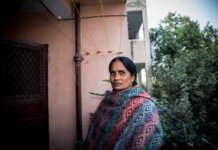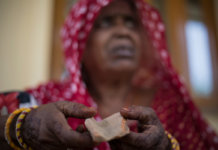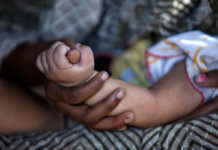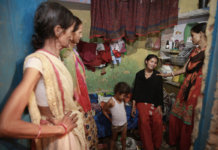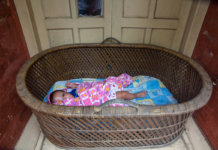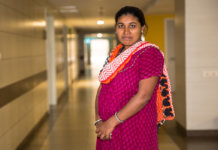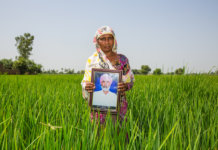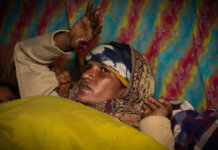Battling the tears, Subhash Bidve, feels as much anger as he does pain when he hears his son’s killer is still making headlines even behind bars.
The first anniversary of the death of his only son, Anuj Bidve, 23, is on Boxing Day.
Psycho Kiaran Stapleton tragically shot Anuj at point blank range in a random, unprovoked, attack on the streets of Manchester last year.
Stapleton was finally found guilty of murdering Anuj but he has never shown any remorse.
And earlier this month he went berserk after losing an appeal against his 30-year stretch and took a chaplain hostage.
‘He’s the devil,’ says Subhash, 55, talking from his home in Pune, India. ‘A disgusting human being. He has never shown any remorse for killing my gentle son. If God really exists he should give him some sense. He needs to understand the pain he subjects on others.’

In an exclusive interview Subhash shares his disgust at such a man as Stapleton, and the pain and regret he feels at sending his only son to the UK for his studies that ultimately led to his death.
‘Anuj had always wanted to study overseas and as a teenager he often begged me to let him go. I used to tell him he’d do just fine without studying overseas because he was a good student but he’d insist, always begging. So in the end I agreed, and I remortgaged my house to raise the £25,000GBP he needed,’ Subhash says.
He has never shown any remorse for killing my gentle son
On September 26th, last year, Anuj drove one last time as he and the family took the family car from Pune to Mumbai airport.
While everyone else cried, Anuj was excited as he said his goodbyes.
His mother had packed his bags, and even stuffed his favourite Indian spices and pickles, along with some of her recipes, knowing he’d be home sick.
The next day, Anuj called his family on Skype from his accommodation at Lancaster University, and he sounded happy and content.
‘He sounded so happy,’ remembers Subhash. ‘He was excited to meet new friends and experience a new country. He sounded good, I was really proud of him. From then on he called us on Skype at 10pm every day without fail.’
Three months later, just before Christmas, Anuj and eight of his friends decided to visit Manchester for a few days.
On Christmas day Anuj called his family in India and wished them a Happy Christmas.
Subhash, who retired from the Indian Air Force in 1991 and now works for a French energy company, in Pune, says: ‘We’re Hindu so we don’t celebrate Christmas, but as he was in the UK Anuj got into the spirit of things and so did we wishing him a Happy Christmas in return. He told us he was going to visit a church and a football club in Manchester with his friends and then we said our goodbyes. That was the last time I ever spoke to him.’
Subhash was in work the next day when his nephew called him at around 2pm.
‘My nephew told me he’d had a message from a UK friend on Facebook saying that something terrible had happened to Anuj,’ Subhash adds. ‘I couldn’t digest his words and kept asking him what he meant? But he didn’t know anything. So I immediately called the Manchester Police begging for answers. Even hospitals in the area.’
Subhash quickly drove home to tell his wife Yogita, 53, and daughter Nehal, 28. They collapsed crying.

‘I felt completely helpless. We had no answers or explanations, we were kept waiting for hours,’ he adds.
Five hours later, the Metropolitan Police finally confirmed Anuj had been shot and killed.
Subhash says: ‘I actually can’t remember what I did when I heard, or how I reacted, I can’t even remember the words properly. It’s all a blur. Even now I cannot believe my son is gone.’
Nehal, who works for Volkswagen India, asked her UK friends for help and they did all they could, until eventually Subhash was told the family could fly to the UK to pick up Anuj’s body.
Even now I cannot believe my son is gone.’
On January 4th they flew to the UK and finally identified their son’s body.
‘By the time I saw Anuj I had stopped thinking of my emotions, and the pure heartache of it all. I had become very matter of fact, and all I cared about was getting my son home. I’d already had plenty of time to accept that my son had been murdered in the most brutal way, but now I had to make sure he got the goodbye he deserved,’ he adds.
Subhash and Yogita, and their son-in-law, Rakesh Sonawane, spent three days in the UK. During that time hey managed to meet Anuj’s university friends and lecturers, collect his belongings from his university room and take flowers to the spot where he was killed.
Subhash remembers: ‘People stopped us on the street to express their own emotions and sympathies. They wanted to tell us of their own anger at the killer. It was heartening, and I was really touched by how kind the Manchester people were.’
On January 7th Subhash took Anuj’s body back to India and had his body cremated in a traditional Hindu ceremony. Thousands of people lined the streets of Pune, and attended his funeral.
The next few months passed by in a blur, the family’s only focus was the trial and making sure Kiaran Stapleton was found guilty and there was justice.

‘I was impressed how the Manchester Police built such a strong case, we were so grateful. They helped us throughout, in every possible way and they continually kept us informed of developments,’ Subhash added.
‘Both the Indian and British press also made their contributions and went to great efforts to bring the killer to justice. I think they played a vital role and I appreciate that greatly.’
In July the family flew back to UK for the trial at Manchester Crown Court.
Subhash says: ‘When I was sitting in the court and I was watching my son’s killer enter I thought I’d be angry. I thought I would want to spit on him, shout at him or hit him but there was nothing. All I kept asking myself was why?’
‘I was amazed at how arrogant he was. There was no remorse. He even laughed. I believe he actually took pride in killing my son, such a disgusting human being.’
I believe he actually took pride in killing my son, such a disgusting human being
At the trial it was revealed that Anuj had tragically been in the wrong place at the wrong time. Standing at just 5ft 4in tall, he was an easy target for a cowardly killer like Stapleton who towered above him, and attacked him from behind.
Subhash says: ‘When the guilty verdict was called out I only felt relief. Justice had been done. There’s no happiness in any of it. I just wanted to go home and try to pick up the pieces.’
Subhash and the family decided not to speak to the press, until now. They were too devastated to speak to anyone about their loss for many months.
They have spent the last six months trying to live their lives, go about their day-to-day business but they still cannot accept their son has gone.
He adds: ‘We can’t let go. We still think he’s going to walk through the door and give us a hug. To think of him dead gives me a cold chill. I don’t know how to explain it. We can’t end our own lives but our world as we knew it, our old life is over.
‘My wife cries a lot, when she’s cooking or cleaning she just starts sobbing. I suppose I have work as a distraction but it’s harder for my wife. I don’t know how it will ever get any easier.’
Subhash is now left with an overwhelming feeling of guilt that he ever agreed to let his son go to the UK.
I regret ever sending him to UK. If only I knew what was going to happen
He adds: ‘Sometimes I get very angry and I regret ever sending him to UK. If only I knew what was going to happen. But destiny is what it is; I can’t change that.
‘I don’t think the UK is necessarily a racist country. I suppose there’s some racism in every country. But there are bad parts of it and bad areas. Other foreign students need to understand the bad areas.
‘But I just want to ask the killer why? Why did he have to kill our son?’

